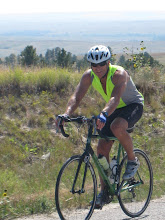Do you worry about whether or not you're training hard enough, or, if your recovery rides are easy enough? Or, if you are like I used to be you don't concern yourself with the incidentals, you just want to ride your bike (as much as schedule, weather and physical limits allow). Most recreational cyclists I know simply ride their bike, picking up the tempo on the hills or during select sections of infrequent group rides. Although this routine builds endurance it doesn't do much to build strength. In order to build strength you have to do intensity, i.e., intervals. By riding intervals, preferably almost to failure, the leg muscles gain strength through predictable physiological improvements. But, how do you know how hard to do the intervals?
The Old School methods involved either a heart rate monitor or RPE (Relative Perceived Exertion), both measures of input, not output, as thoroughly discussed in Alex Hutchinson's latest book, Which Comes First, Cardio or Weights?: Fitness Myths, Training Truths, and Other Surprising Discoveries from the Science of Exercise. In order to measure output you need a New School method (i.e., power meter). The power meter incorporates metal strain gauges either in the hub or crank arm, readout on a headset (which can be downloaded for precise quantification of output, i.e., work) and is reproducible from one workout to the next (regardless of the route, weather conditions, your temperament, etc). The most useful measure of output (work) is watts (power) and power-to-weight ratio (Watts/Kg) is the single most important quantification of climbing and overall riding ability as detailed in Training and Racing With A Power Meter by Hunter Allen and Andrew Coggan.
As Allen and Coggan explain, simply bite the bullet, buy a power meter and start training smarter. Their book provides a cookbook approach to power training and can be useful to determined riders. Another way to go is to hire a coach at the same time you buy your power meter. A coach comes in darn handy, he walks you through the steps required to get the power meter/website wired and he also serves as your mentor, assigning workouts, analyzing power files and passing judgement on your efforts.
As my coach always says, "You've done the hard work. You get to enjoy the results." The hard work he's referring to are intervals and the enjoyment comes from seeing your average power numbers increase in response to your training.
Part II: The Results
Monday, February 6, 2012
Subscribe to:
Posts (Atom)
